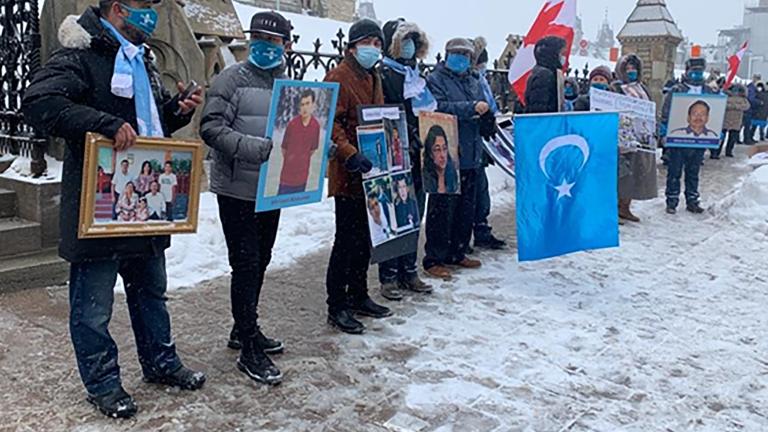This release is more than two years old
This release is more than two years old. For additional information, please contact Amanda Gaudes from our Media Relations team.
News release details
Two Manitobans who witnessed the dramatic escalation of mass detentions, disappearances and other human rights violations against the Uyghur people of East Turkestan (Xinjiang) in China will moderate a virtual event this week organized by the Canadian Museum for Human Rights and Steinbach’s Mennonite Heritage Village.
An estimated 1.8 million Uyghurs and other Turkic people have been detained in “re‐education” facilities over the past five years amid reports of violence, torture, gang rape, forced labour and mass sterilization.
Gary and Andrea Dyck lived in East Turkestan for 10 years before leaving in 2018 after a third of the Uyghur grape farmers they worked with were forced into detention, which decimated their composting business (a social enterprise intended to help low‐income farmers). They were among the last Canadians to leave the region.
They will be joined at the live event by panellists Mehmet Tohti, a Uyghur‐Canadian activist who had 37 family members in China disappear after he began raising alarms about mass detentions in 2016, and Adrian Zenz, a German researcher now living in Minnesota, who was among the first in the world to uncover hard evidence of these human rights violations. (See backgrounder below.)
What / When / Where
- WHAT: Exposing the Uyghur genocide: A virtual panel discussion
- WHEN: Thursday, April 22, 1 p.m. to 2:30 p.m. CDT
- WHERE: Live on Zoom (online). Please register in advance. Free.
About the event
In February, Canada’s House of Commons voted to declare China’s actions against the Uyghurs to be genocide. April is Genocide Remembrance, Condemnation and Prevention Month as declared by Canada’s House of Commons in 2015.
About the panellists
Mehmet Tohti
Tohti, who leads the Ottawa‐based Uyghur Rights Advocacy Project (URAP), will present his group’s new report about the destruction of the Uyghur family unit as a method of genocide. It includes more than 600 hand‐written, first‐hand testimonies provided to them in 2018 and 2020 by refugees in Turkey.
Everything that makes the Uyghurs unique – their language, culture, architecture, art, dance, folklore and religion – is being targetted by the Chinese government, Tohti said. Detainees in re‐education facilities are told they must renounce Islam, pledge allegiance to the Chinese Communist Party and speak only Mandarin. “Our identity as a people is in the process of total destruction in front of the whole world.”
The URAP report details family destruction through separation (internment in re‐education facilities, arbitrary prison sentences, forced labour camps and disappearances); isolation from family members who live abroad; and disruption via state‐appointed ethnic Chinese people who “homestay” for lengthy periods with Uyghur families.
Adrian Zenz
International exposure of the genocide can be partly credited to Zenz, a senior fellow in China Studies with the Victims of Communism Foundation, based in Washington DC. After China denied mass detentions were occuring, he led research probing Chinese government documents and satellite photographs that provided some of the first proof cited by the United Nations and reported by international media.
Zenz will also speak at the event about his findings that mass sterilization of Uyghur women is underway after he noticed a dramatic decline in the birthrate that could not be explained simply by mass detentions. He subsequently uncovered reports of enforced or coerced birth control through IUDs and state plans for mass sterilization. Zenz has also recently been subjected to a series of lawsuits, backed by Beijing, over his reporting of forced labour in East Turkestan cotton fields.
Gary and Andrea Dyck
Starting in 2016, the couple saw a massive expansion of the police state around their home in Turpan, Xinjiang, with new police stations cropping up on every major intersection, security cameras, surveillance infrastructure and huge re‐education facilities with guard towers and razor wire.
“Within months, we noticed the streets of the villages around us become much emptier and we saw a re‐education camp built just 10 minutes down our road,” said Gary, now the executive director of the Mennonite Heritage Village. Andrea is a family coach and educator. “Every family lost someone. People were living in fear all the time, with police presence everywhere. To our horror, we saw their already frail life and cultural situation being decimated and in 2018 we had to leave. We had gone there to help people, but things were becoming so much worse.”
This release is more than two years old
This release is more than two years old. For additional information, please contact Amanda Gaudes from our Media Relations team.
